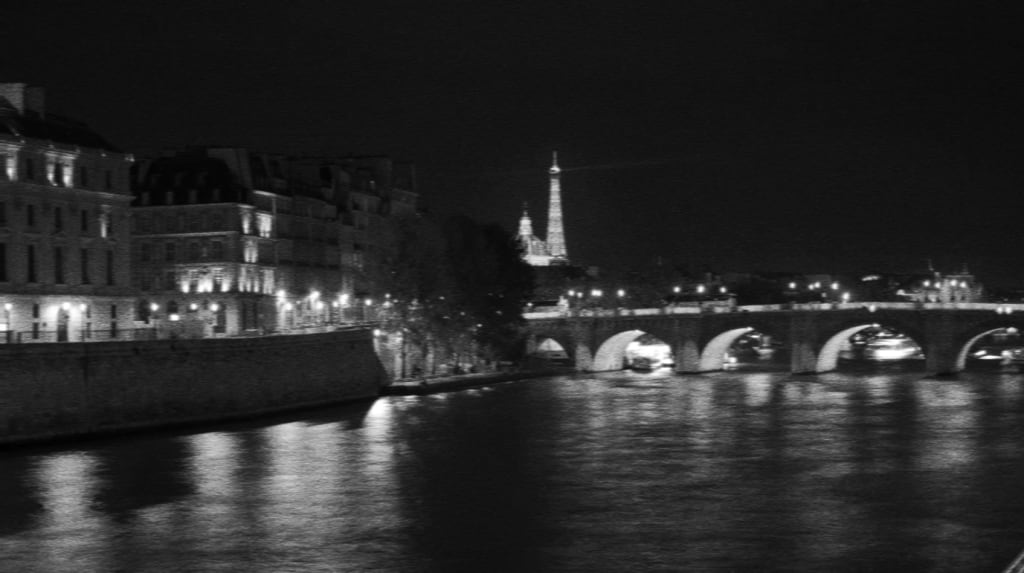
It was ten to one. I’d watched the crowd inside the Hotel Lutetia bar thin out as people moved on from drinks to lunch, and now it was only me, the bartender, and four noisy Germans who showed no interest in food. I sat in the corner, alone, with the morning’s Figaro rolled up on the table in front of me, as instructed. Through the big picture window I watched blurry figures hurrying through the fog on Boulevard Raspail.
“He calls himself ‘La Taupe,’” my editor had told me an hour earlier, “but everyone else calls him a petty thief. Has ambitions beyond his talents. But he’s got luck too, because the day before yesterday he found something worth its weight in diamonds.”
“What is it?”
“A little black notebook, which he liberated from the apartment of one Iveta Rosental. She’s Latvian—an orphaned refugee who landed in Paris just as the Iron Curtain was being pulled shut. She’s grown now, obviously, and she’s grown reliant on the generosity of some very prominent men. Men in government, in business, in everything that gives a man power.”
“And her notebook names them.”
“It does a lot more than name them, brother. The details of how they passed their nights away from home are, let’s just say, unsparing. She’d make a hell of a reporter.”
“How much is he asking?”
“Twenty grand American. He sent a photo of two pages from the notebook. Just those two pages implicated a sitting minister and a magistrate in terms that made this marine blush.”
“What use is it to us? Would we even report what’s in this thing?”
“That depends on what we find. But Miss Rosental’s diary might be more useful unpublished. Just the fact we have it could make certain people a little more press-friendly. Besides, if we don’t buy it, you can bet La Taupe will find an eager customer somewhere else.”
The Hotel Lutetia was approaching the half-century mark, and while it needed a good scrub on the outside, it remained a Belle Epoque gem, an opulent artifact of a time before two world wars and the looming threat of nuclear annihilation. It had picked a great half-century to call its first.
The clock above the bar chimed once, and through the door from the lobby appeared a short, wiry man in a blue suit and a black overcoat. He headed straight toward me, stood over the table, and unrolled the Figaro. Inside was an interoffice memo envelope from the UPI. He opened that, smiled at the contents, and rolled it back into the newspaper. He reached into the overcoat and pulled out the luckiest break he’d ever got. It landed on the table with an ordinary slap. It didn’t look like twenty grand worth of anything.
“What’s your name?” He had an adenoidal voice and a Provençal accent. His hair was bright black and combed straight back.
“Martin Bass,” I said.
“Enjoy your purchase, Monsieur Bass.”
With that he tucked the paper under his arm, wheeled around, and exited through the lobby door. He’d been in the room less than a minute.
I opened the notebook and began to read. It didn’t disappoint. After the first page I heard myself asking the bartender for a tall whiskey. By page three I’d begun skimming Iveta Rosental’s lavish prose seeking out names without the sordid details. There were many names—names I knew, names I’d seen on the front page. But none of them stood out more than that of Félix Aron, the most notoriously vicious figure in the Parisian underworld.
And there was no one Iveta Rosental described more tenderly.
Four hours later, the notebook was locked in my editor’s desk, and I headed into the January night with nothing more on my mind that a greasy Alsatian sausage and a large beer. As I stepped out onto Rue des Italiens, someone grabbed the sleeve of my coat.
“Monsieur Bass?”
She stood against the wall in the doorway alcove. She was around twenty-five, small and pale, with eyes of green or blue and an upper lip slightly larger than the lower one. She was bundled in an expensive winter coat. Red hair curled out from under a smart black hat.
“Do you know who I am?”
“Yes.”
“Then you know what you’ve taken from me.”
“I know my employer wanted a notebook,” I said. “So I went to the Hotel Lutetia and got it. I don’t know anything besides that.”
“I need it back.”
“I can’t help you.”
“You have to.” Her eyes got wide and caught the light. They were green after all. “You’ve seen what’s in it. You understand what it means to me.”
“How do you know what I’ve seen? And how do you know my name?”
“I have friends, too, Bass. Not just lovers. I have people I can count on in all sorts of places.”
“Sorry, Miss Rosental, but I’m not one of them.”
“You don’t have it?”
“It’s inside, under lock and key.”
“Can’t you get it back?”
“It’s not my lock and it’s not my key. And it’s not my job to break into anyone’s office.”
Her eyes weren’t nearly as wide now.
“Do you know what you’ve done?” she said, her voice gone flat. “You’ve made me an outcast in the only home I’ve ever had.”
“I’m sorry.”
“No you’re not. You think I deserve it. I’ve lived the life I’ve had to, and to you and your bosses that makes me fair game. You’ve ruined Paris for me, and I can’t afford to go anywhere else. But that’s no concern of yours, is it? You just wanted secrets. So you took all of mine and made me a prisoner in a city where I’m now worthless.”
She left the doorway and walked toward the boulevard. I watched her reach it and hail a cab. She got in, spoke to the driver, and didn’t look back as the cab pulled away.
At eight o’clock there was a knock at my apartment door. I opened it on a tall man of sixty with a heavy mustache and a wet trilby hat.
“Martin Bass?”
“Yes.”
“I’m Agent Mesrine of the Police Judiciaire.”
I invited him in and offered him a chair. He shook his hat off over the kitchen sink and remained standing.
“We received a complaint from Iveta Rosental that you have a notebook belonging to her.”
“I don’t.”
“But you know where it is.”
“Do I need a lawyer?”
Mesrine made a half-hearted stab at a smile. “Listen, Bass. I don’t care about the book, or about you. If I arrest you for buying stolen merchandise, you’ll claim ignorance and no one will doubt it. All I want is information about the man you bought it from.”
“La Taupe.”
“Yes, a silly little man who’s in way over his head. Have you heard of Félix Aron?”
“Of course.”
“Aron is a friend of Rosental. Before she came to see us, we received word that Aron had men looking for La Taupe. It’s all the same to me if Aron’s men finish the job, but I’d rather solve a burglary than a murder. Do you know where La Taupe is staying?”
“Probably Hotel Lutetia. That’s where he met me, arriving and leaving through the lobby in a bone-dry overcoat.”
“Maybe he just wanted to give you that impression.”
“I doubt it. If you had twenty thousand dollars in your pocket, how much time would you spend on the streets of Paris?”
“Good point.”
“If I could figure that out, so could Félix Aron. And since I told Iveta Rosental about the Hotel Lutetia, Aron knows that, too.”
“Get your coat.”
“Why?”
“Because you know who we’re looking for. To me, La Taupe’s nothing but a ridiculous nickname.”
Mesrine double-parked on Boulevard Raspail and turned off the siren. We’d barely made it to the sidewalk when a woman’s scream came from across the street. We both looked in her direction just as the pavement trembled beneath our feet.
He’d landed about fifteen feet away from where we stood. He was on his side but rolled onto his back. I saw the overcoat and the slick hair and said, “It’s him.”
Mesrine knelt beside him and yelled into his face.
“Who did this? Answer me!”
“Forget it,” I said. “He doesn’t know if he’s dead or alive.”
“He’ll figure it out soon enough.”
Mesrine ran to the doorman and told him to call the Trente-six and ask for five officers. In the meantime he was to block all exits and watch for men who weren’t known guests at the hotel.
La Taupe heard it all. While Mesrine shouted orders, the little man in the spreading pool of blood looked up at me, and smiled.
Slowly, with great effort, he reached for his lapel and pulled open his overcoat. Sticking out of the inside pocket was a yellow envelope, and on the envelope was printed the emblem of the United Press International.
A second later, the pocket it was in was mine.
She opened the door in bathrobe and slippers. Her hair was wet and uncombed. She wasn’t happy to see me and didn’t pretend to be. I wasn’t so much invited in as not barred. There was no talk of drinks.
She sat down at a white secretary desk, lit a cigarette, and combed her hair.
“He’s dead,” I told her.
“Who?”
“The man who took your notebook.”
She wanted to smile but decided she wouldn’t give me the satisfaction.
“He fell off his sixth-floor balcony.”
She looked suddenly worried. “Félix?”
“Maybe. The police looked for his men but didn’t find them. They might have been too smart to get caught. Or it might have even been suicide. I can imagine how he felt with Félix Aron after him.”
She put her comb down and stared off somewhere. “My God, to be so desperate.”
I reached inside my coat and took out the envelope. She glanced up at me when I put it on the desk, then she picked it up and looked inside.
“How much—”
“All of it. Every penny. It was your notebook, so it’s your money.”
She stood up and put her arms around me.
“I’m sorry,” she said. “I misjudged you. Thank you, Martin.” There were tears in her eyes, on her cheeks. “Will I end up in the papers?”
“I don’t know. But if you do, at least now you can start over someplace else. You’re not a prisoner.”
“Start over,” she repeated. “With twenty thousand dollars I can start over anywhere. I take it all back, Martin, everything I said. You can’t even know how much you’ve...” She looked up. Her face was pure relief, pure gratitude, pure admiration.
“You’ve saved me,” she said.
The next morning I woke up early with a number in my head. The number was twenty thousand. It meant a lot to me, and it meant the world to Iveta Rosental.
But it was a number she shouldn’t have known. I hadn’t told her how much the envelope contained, how much her diary had cost. She’d found that out on her own. And as I woke up I knew she’d learned it from the little man who’d landed on Boulevard Raspail the night before.
I called but got no answer. I went to her apartment. The concierge said she’d left in the wee hours, no forwarding address given. Iveta Rosental had already begun her new life.
Aron’s men hadn’t got away. They’d never been there. She took care of La Taupe herself. She could have got the money from him herself, too, but that would’ve been incriminating if she’d been searched. So much better that I brought it round to her instead.
After all, I was in no position to go to the police about it. Not even if I’d wanted to.
About the Creator
Nick Goulding
I grew up near Boston then lived in NYC for 16 years, mostly tending and managing bars. My wife and I lived for a while in a fishing village in Italy before moving to Austin, where I own & operate a restaurant called Cafe Malta.
Enjoyed the story? Support the Creator.
Subscribe for free to receive all their stories in your feed. You could also pledge your support or give them a one-off tip, letting them know you appreciate their work.






Comments
There are no comments for this story
Be the first to respond and start the conversation.